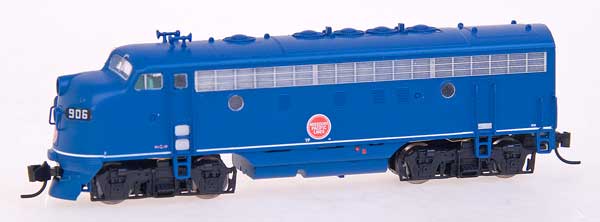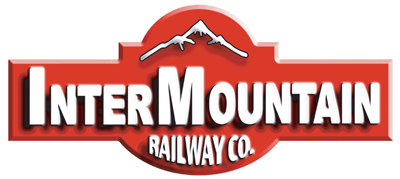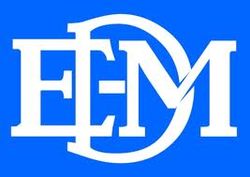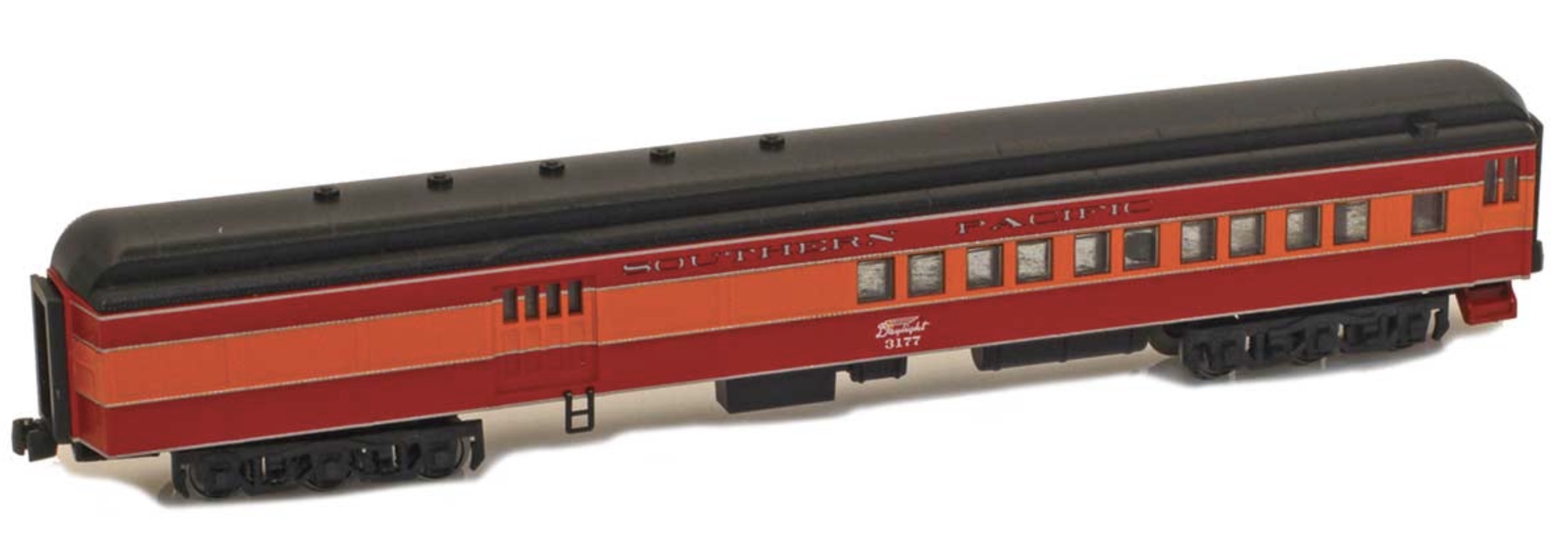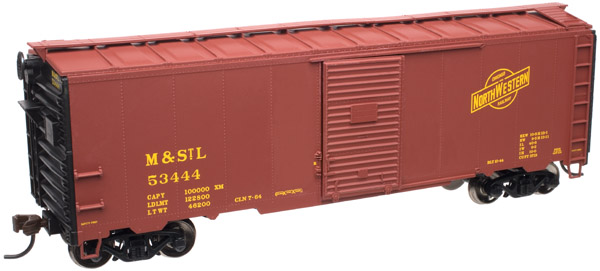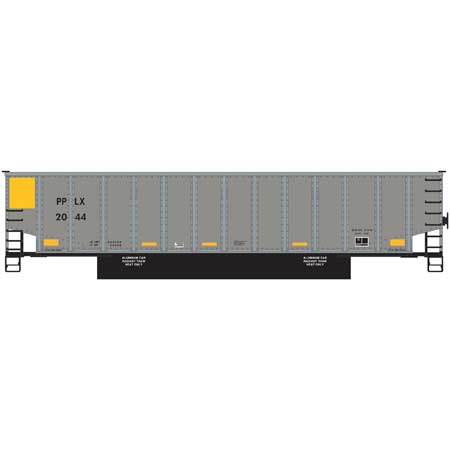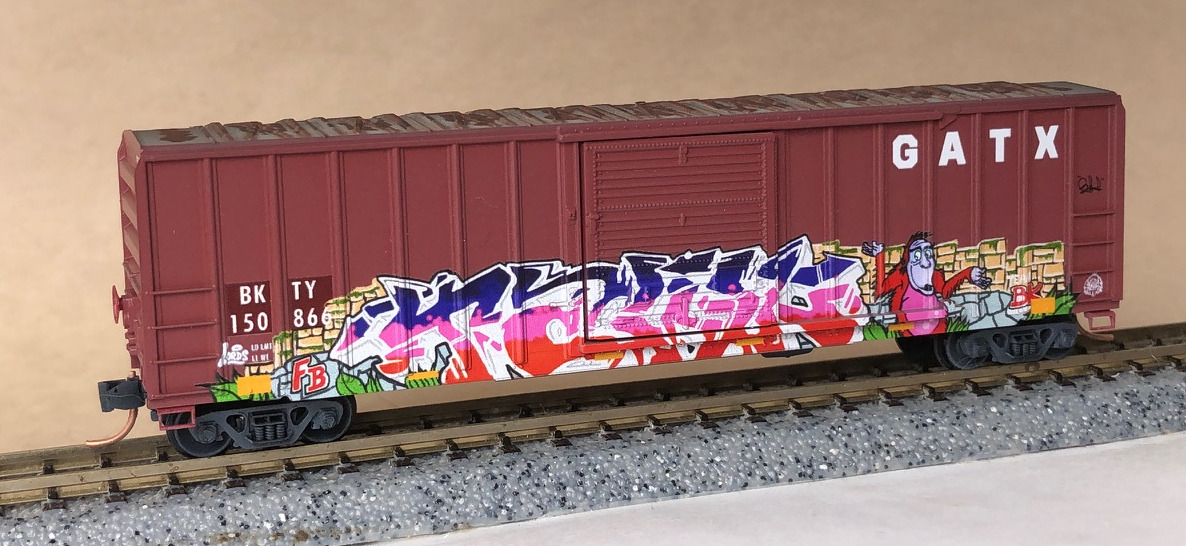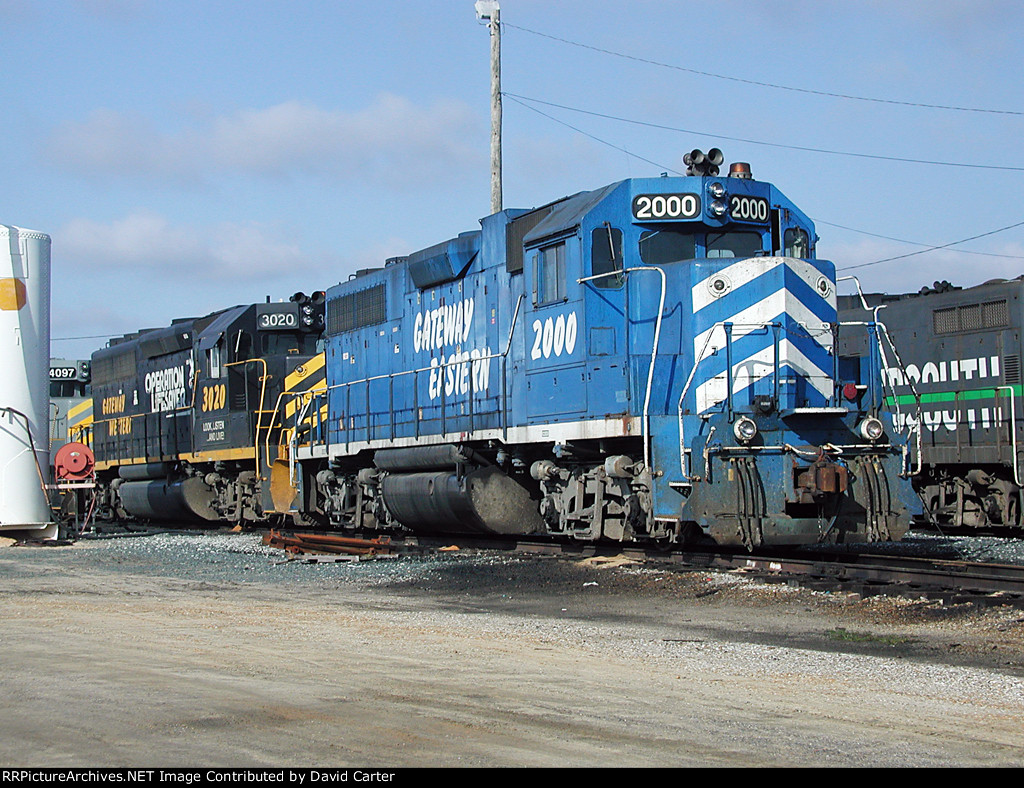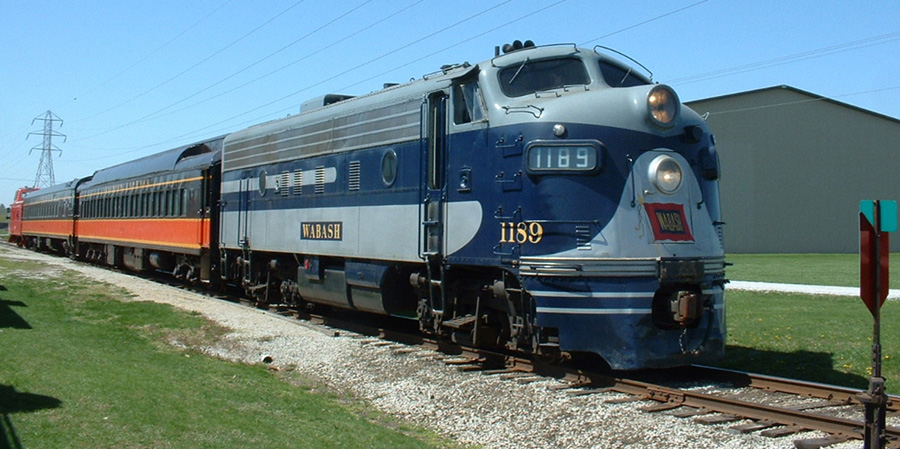Model Information:
Features of this model include (2023 run):
Features of this model include (2023 run):
- LED lighting - All lights separately controllable on DCC units.
- Upper nose MARS Light (where applicable)(single headlight units, upper nose light acts as the headlight)
- Lower Headlight (where applicable)
- Illuminated number boards
- Ditch Lights (DCC only)(No units factory equipped with ditch lights, however LEDs are provided for use by the modeler)
- Wire & Etched metal details
- Laser sharp painting and printing
- Micro-Trains compatible couplers
DCC Information:
The 2023 run is available in 3 versions:
The 2023 run is available in 3 versions:
- DC models equipped with a DC only circuit board and are DCC Ready.
- Non-Sound equipped with an ESU LokPilot 5 DCC decoder (stock number suffixed by letter D)
- Sound units equipped with an ESU LokSound 5 sound decoder. Real F7 locomotive recordings used for superior accuracy and quality! (stock number suffixed by letter S)
Prototype History: The F7 was the fourth model in GM-EMD's successful line of F unit locomotives, and by far the best-selling cab unit of all time. In fact, more F7's were built than all other F units combined. It succeeded the F3 model in GM-EMD's F unit sequence, and was replaced in turn by the F9. Final assembly was at GM-EMD's La Grange, Illinois, plant or GMD's London, Ontario, facility.
The F7 differed from the F3 primarily in internal equipment (mostly electrical) and some external features. Its continuous tractive effort rating was 20% higher (e.g. 40,000 lb (18,000 kg) for an F7 with 65 mph (105 km/h) gearing, compared to 32,500 lb (14,700 kg) for an F3 with the same gearing.
A total of 2,366 cab-equipped lead A units and 1,483 cabless-booster or B units were built. (Note: the B unit is often referred to as an "F7B", whereas the A unit is simply an "F7".)
Many F7s remained in service for decades, as railroads found them economical to operate and maintain. However, the locomotive was not very popular with yard crews who operated them in switching service because they were difficult to mount and dismount, and it was also nearly impossible for the engineer to see hand signals from a ground crew without leaning way outside the window. As most of these engines were bought and operated before two-way radio became standard on most American railroads, this was a major point of contention. In later years, with the advent of the "road switchers" such as the EMD GP7, F units were primarily used in "through freight" and "unit train" service where there was very little or no switching to be done on line of road.
From Wikipedia
Read more on American-Rails.com
The F7 differed from the F3 primarily in internal equipment (mostly electrical) and some external features. Its continuous tractive effort rating was 20% higher (e.g. 40,000 lb (18,000 kg) for an F7 with 65 mph (105 km/h) gearing, compared to 32,500 lb (14,700 kg) for an F3 with the same gearing.
A total of 2,366 cab-equipped lead A units and 1,483 cabless-booster or B units were built. (Note: the B unit is often referred to as an "F7B", whereas the A unit is simply an "F7".)
Many F7s remained in service for decades, as railroads found them economical to operate and maintain. However, the locomotive was not very popular with yard crews who operated them in switching service because they were difficult to mount and dismount, and it was also nearly impossible for the engineer to see hand signals from a ground crew without leaning way outside the window. As most of these engines were bought and operated before two-way radio became standard on most American railroads, this was a major point of contention. In later years, with the advent of the "road switchers" such as the EMD GP7, F units were primarily used in "through freight" and "unit train" service where there was very little or no switching to be done on line of road.
From Wikipedia
Read more on American-Rails.com
Road Name History: 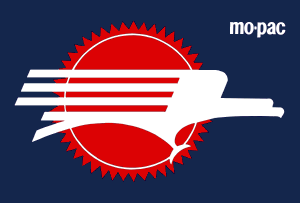 The Missouri Pacific Railroad (reporting mark MP), commonly abbreviated MoPac, with nickname of The Mop, was one of the first railroads in the United States west of the Mississippi River. MoPac was a Class I railroad growing from dozens of predecessors and mergers, including the St. Louis, Iron Mountain and Southern Railway (SLIMS), Texas and Pacific Railway (TP), Chicago and Eastern Illinois Railroad (C&EI), St. Louis, Brownsville and Mexico Railway (SLBM), Kansas, Oklahoma and Gulf Railway (KO&G), Midland Valley Railroad (MV), San Antonio, Uvalde and Gulf Railroad (SAU&G), Gulf Coast Lines (GC), International-Great Northern Railroad (IGN), New Orleans, Texas and Mexico Railway (NOTM), Missouri-Illinois Railroad (MI), as well as the small Central Branch Railway (an early predecessor of MP in Kansas and south central Nebraska), and joint ventures such as the Alton and Southern Railroad (AS).
The Missouri Pacific Railroad (reporting mark MP), commonly abbreviated MoPac, with nickname of The Mop, was one of the first railroads in the United States west of the Mississippi River. MoPac was a Class I railroad growing from dozens of predecessors and mergers, including the St. Louis, Iron Mountain and Southern Railway (SLIMS), Texas and Pacific Railway (TP), Chicago and Eastern Illinois Railroad (C&EI), St. Louis, Brownsville and Mexico Railway (SLBM), Kansas, Oklahoma and Gulf Railway (KO&G), Midland Valley Railroad (MV), San Antonio, Uvalde and Gulf Railroad (SAU&G), Gulf Coast Lines (GC), International-Great Northern Railroad (IGN), New Orleans, Texas and Mexico Railway (NOTM), Missouri-Illinois Railroad (MI), as well as the small Central Branch Railway (an early predecessor of MP in Kansas and south central Nebraska), and joint ventures such as the Alton and Southern Railroad (AS).
In 1967, the railroad operated 9,041 miles of road and 13,318 miles of track, not including DK&S, NO&LC, T&P and its subsidiaries, C&EI and Missouri-Illinois.
On January 8, 1980, the Union Pacific Railroad agreed to buy the Missouri Pacific Railroad. Lawsuits filed by competing railroads delayed approval of the merger until September 13, 1982. After the Supreme Court denied a trial to the Southern Pacific, the merger took effect on December 22, 1982. However, due to outstanding bonds of the Missouri Pacific, the merger with Union Pacific become official only on January 1, 1997.
Read more on Wikipedia.

In 1967, the railroad operated 9,041 miles of road and 13,318 miles of track, not including DK&S, NO&LC, T&P and its subsidiaries, C&EI and Missouri-Illinois.
On January 8, 1980, the Union Pacific Railroad agreed to buy the Missouri Pacific Railroad. Lawsuits filed by competing railroads delayed approval of the merger until September 13, 1982. After the Supreme Court denied a trial to the Southern Pacific, the merger took effect on December 22, 1982. However, due to outstanding bonds of the Missouri Pacific, the merger with Union Pacific become official only on January 1, 1997.
Read more on Wikipedia.
Brand/Importer Information: InterMountain was founded in 1985 by Fred Brummet. They got started in the model railroad business by producing O-Scale model kits. They got started in the N Scale business almost a decade later when in 1994 they introduced the 40-23 reefer car in kit form. Later, in 1998, they started producing RTR (Ready-to-Run) models. By the early 2000s, InterMountain phased out kit production in favor of the RTR models.
The InterMountain Railway company is located at 1224 Boston Ave in Longmont, CO. They are a manufacturer of HO, N and Z scale model trains. They have produced kits as well as RTR (Ready-To-Run) models. Their N Scale products include locomotives as well as rolling stock. Their rolling stock lineup includes Boxcars, Hoppers, Tank Cars, Reefers, Gondolas, Stock Cars and Flatcars.
Their locomotive releases have primarily been diesel units, with the one major exception being their series of AC-12 Cab Forward steam locos. Their diesel lineup includes F3's, F7's, F9's, SD40's, SD45's and FT units. They are known for quality and detail. They also release their rolling stock in larger varieties of road numbers than most of the other manufacturers.
The InterMountain Railway company is located at 1224 Boston Ave in Longmont, CO. They are a manufacturer of HO, N and Z scale model trains. They have produced kits as well as RTR (Ready-To-Run) models. Their N Scale products include locomotives as well as rolling stock. Their rolling stock lineup includes Boxcars, Hoppers, Tank Cars, Reefers, Gondolas, Stock Cars and Flatcars.
Their locomotive releases have primarily been diesel units, with the one major exception being their series of AC-12 Cab Forward steam locos. Their diesel lineup includes F3's, F7's, F9's, SD40's, SD45's and FT units. They are known for quality and detail. They also release their rolling stock in larger varieties of road numbers than most of the other manufacturers.
Item created by: CNW400 on 2021-06-30 11:47:51. Last edited by CNW400 on 2021-06-30 11:47:52
If you see errors or missing data in this entry, please feel free to log in and edit it. Anyone with a Gmail account can log in instantly.
If you see errors or missing data in this entry, please feel free to log in and edit it. Anyone with a Gmail account can log in instantly.



